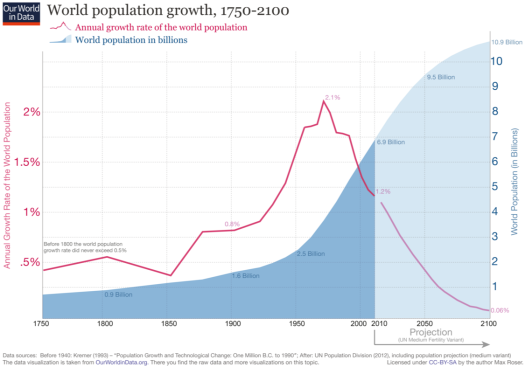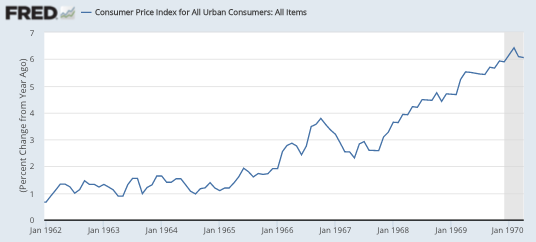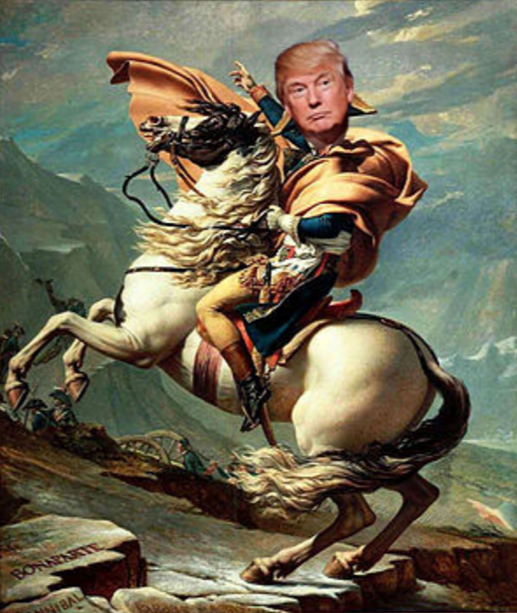[Most readers will want to skip this annoying exercise in boomer nostalgia. If you are a Zhangke Jia fan then go see “Mountains May Depart” instead, my favorite film of the past year.]
I sometimes think the last half of the 1960s was the most interesting period in my lifetime. I was a bit too young to have “been there” in a Woodstock sense, but I do recall quite a bit of what happened, especially in 1968. Since the post will be almost entirely subjective, let me start with a few objective facts. Here’s a graph of world population growth rates:
 Unfortunately I was not able to find a much more interesting graph that I once saw, which went from 10,000 years BC to 10,000 years AD. It was flat as a pancake near 0% growth for thousands of years, then a very narrow spike up to 2.1% in the late 1960s, and then flat as a pancake near 0% growth for thousands of years into the future. When people from 10,000 AD look back at this period, it will be seen as the demographic explosion. (I believe the “notch” right before the peak is the Chinese Great Leap Forward, when 30 million starved to death. Otherwise the early 1960s would have been the peak 5-year period.)
Unfortunately I was not able to find a much more interesting graph that I once saw, which went from 10,000 years BC to 10,000 years AD. It was flat as a pancake near 0% growth for thousands of years, then a very narrow spike up to 2.1% in the late 1960s, and then flat as a pancake near 0% growth for thousands of years into the future. When people from 10,000 AD look back at this period, it will be seen as the demographic explosion. (I believe the “notch” right before the peak is the Chinese Great Leap Forward, when 30 million starved to death. Otherwise the early 1960s would have been the peak 5-year period.)
The late 1960s was also interesting from a political perspective. Student movements erupted all over the world in 1968. Back at home, the worst race riots in US history occurred during 1967 and 1968. The assassinations of Robert Kennedy and Martin Luther King occurred in 1968. The Tet Offensive in Vietnam occurred in 1968, and pushed LBJ out of office. Man first visited the moon in 1968, and the first moon landing would have occurred that year, if not for the tragic fire of 1966. The best sci-fi movie was made in 1968. The biggest airplane that most of you have ever flown on was first produced in 1968.
The political craziness of 1968 didn’t just come out of nowhere. I believe that 1966 was the year of “peak idealism” in American history. A whole raft of highly influential liberal Republicans were elected in 1966, just two years after the Goldwater debacle (Rockefeller, Romney, Scranton, Percy, Lindsey (in 1965), Chafee, Brooke, etc.) Middle class white men, in both parties, actually believed liberal ideas provided the answer to America’s problems.
We could end poverty, go to the moon, and make Southern California a paradise for drivers. Truly anything seemed possible.
Today is the 50th anniversary of two important cultural revolutions. At least important to me and my wife, maybe not to you. (OK, tomorrow is the anniversary, but it’s already tomorrow in China.)
The late 1960s saw a flood of very innovative pop music albums (Sergeant Pepper, Pet Sounds, Beggars Banquet, Are You Experienced, Led Zeppelin, and an album with a banana on the cover, among others.) One of the most important, and my all-time favorite studio album, is Blonde on Blonde, released May 16, 1966. Between 1962 and 1966 Dylan created a lifetime’s worth of musical styles, in 7 studio albums, plus non-album hits (Positively 4th Street) plus unreleased masterpieces (She’s Your Lover Now).
I didn’t start seriously listening to music until the early 1970s, when I was in high school. What surprised me is that you could generally figure out when a song was produced to within a year of so, just based on the sound. Styles were changing that fast. And Dylan’s music always seemed to come out a bit before the rest of the world caught up. I actually think his earlier “Bringing it all Back Home” was his most influential album, and perhaps his best—compare it to other pop music from early 1965—but I love the sound of Blonde on Blonde. (Dylan suggested “The closest I ever got to the sound I hear in my mind was on individual bands in the Blonde on Blonde album. It’s that thin, that wild mercury sound. It’s metallic and bright gold, with whatever that conjures up.”)
BTW, Dylan created that lifetime worth of music before he turned 25.
At the same time that Americans were producing great pop music while getting stoned, the Chinese people were literally getting stoned, at least if they were well educated or if their ancestors were landlords. On the very same day that Blonde on Blonde was released, the Chinese Cultural Revolution began. The eventual death toll is unknown, but certainly an order of magnitude lower than the Great Leap Forward. Nonetheless, in “utility terms” it was one of the most awful things to ever happen. Mao created perhaps the worst society imaginable—at least in urban China. People were put under enormous psychological stress to inflict great cruelty on their friends and family. Society doesn’t get much more perverse than that. Even today, China has not fully recovered, and remains a low trust society relative to the US, although things are certainly improving.
Earlier I talked about 1966 representing “peak idealism” in America. In China, 1966 represented a year when idealism was raised to such a pitch that it ended up being twisted into the exact opposite. In Chinese culture, losing face is about the worst thing that can happen, and the Cultural Revolution was all about public humiliation.
While my wife was suffering through that period, I was listening to Dylan, who shaped my adolescent mind more than any other artist, in any medium:
While one who sings with his tongue on fire
Gargles in the rat race choir
Bent out of shape from society’s pliers
Cares not to come up any higher
But rather get you down in the hole
That he’s in
But I mean no harm nor put fault
On anyone that lives in a vault
But it’s alright, Ma, if I can’t please him
Old lady judges watch people in pairs
Limited in sex, they dare
To push fake morals, insult and stare
While money doesn’t talk, it swears
Obscenity, who really cares
Propaganda, all is phony
PS. I vividly recall wanting to move to California after reading the following National Geographic article, in 1966. I hated the cold weather in Wisconsin. When I dug up the article today I was surprised by the date:
 Oh yeah, this is supposed to be a monetary blog. OK, 1966 is when the Great Inflation began, the defining economic event of my life.
Oh yeah, this is supposed to be a monetary blog. OK, 1966 is when the Great Inflation began, the defining economic event of my life.
The 1960s and 1970s made me a monetarist, and the 1980s made me a market monetarist.







